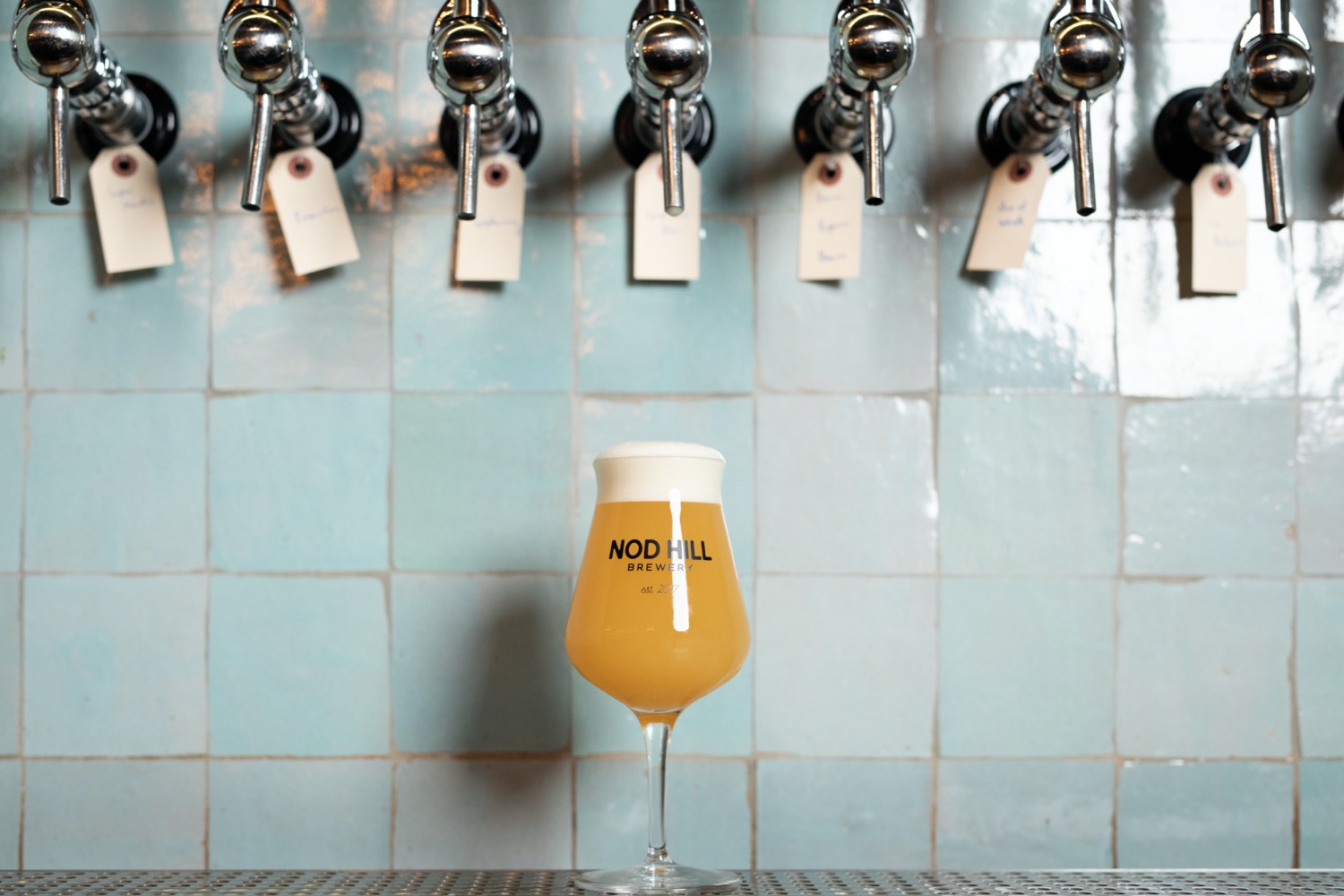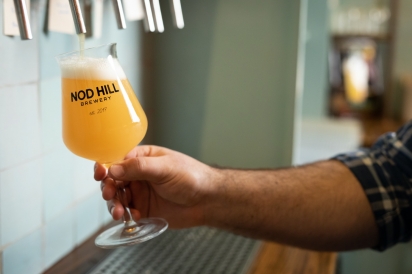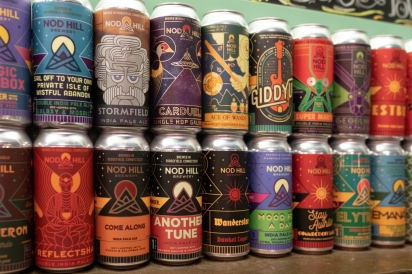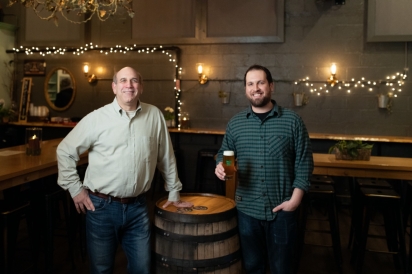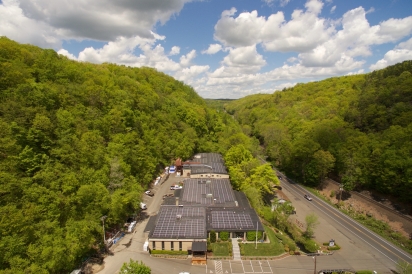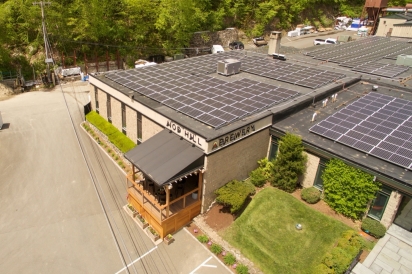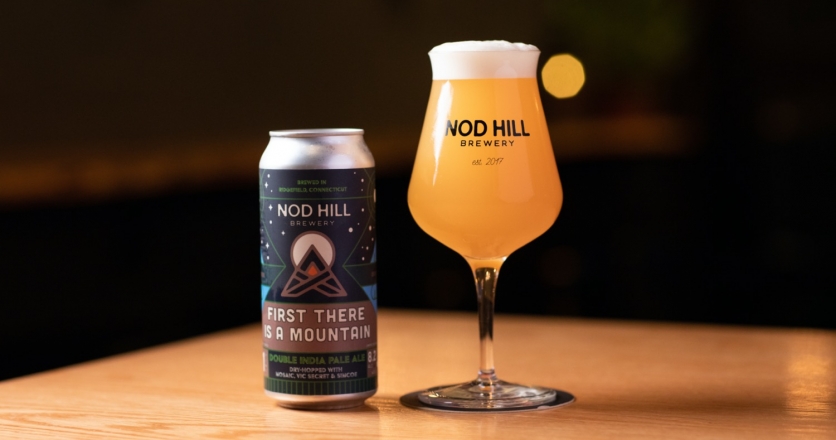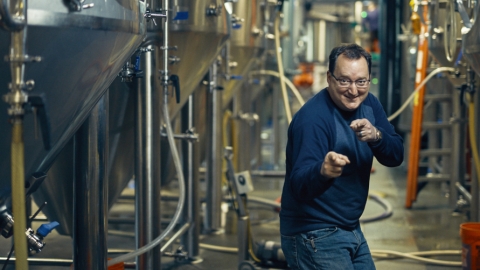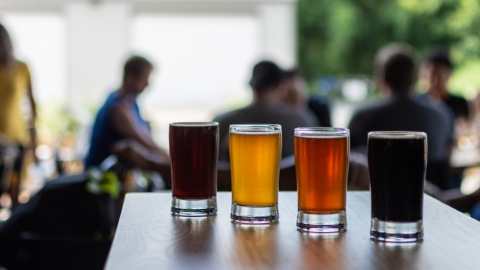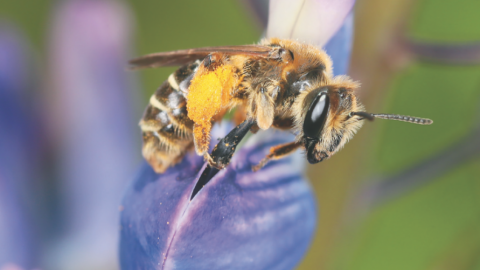Seeking Sustainability at Nod Hill
Perched just above the Norwalk River, in Ridgefield, Nod Hill Brewery seems nearly identical to its many peers across Connecticut. Just off Route 7, visitors walk into a warm, comfortable taproom and brewhouse with hardwood floors and bluish-gray walls. “To make a successful brewery nowadays, start by focusing on the tasting room,” says founding partner Dave Kaye, who developed a love for cask ales working at a pub in the UK. Nod Hill features food trucks every night they are open and live music on Thursdays and Sundays. Dave’s wife, Sarah Zitnay, leads yoga sessions followed by chats over beer.
The beers you find here range from hoppy pale ales, like Tiny Yes, to the English-style, Best Bitter, to the Trappist-style single ale, Ace of Wands. Forbidden Zone is a hoppy Belgian Blonde, Shadow Self is an imperial stout with vanilla beans and locally roasted coffee, and Super Mantis is their popular New-England-style Double IPA. The Helles Lager, Sunrunner, is smooth on the front with a hoppy middle and a long, beery finish. “Recently,” says Dave, “we brewed a beer called ‘Connecticut Grown’ with 100% local hops and malts. We’ve begun making sour beers that not only use local ingredients but are fermented with wild yeasts we’ve cultured from our property.” This delicious variety is due mostly to another founding partner, head brewer Kyle Acenowr, who won awards in New York before helping to start Nod Hill.
Typical story, right? But the surprise is that Nod Hill is one of the most environmentally sustainable breweries in the state. Dave’s father, Robert, bought the factory building in Ridgefield in 2015 and, along with Kyle and Dave, opened the brewery in October 2017. “There is a collaborative spirit in the beer world,” says Robert, who worked previously as a manager in construction, entertainment, and sports marketing. “I didn’t find the competitiveness here that I did in the other industries I worked in.” This helped to bring out a community spirit but, also, “a desire to do better, to be much more sustainable.”
Previously, the building hosted a factory with a powerful electrical grid, and so the partners decided to go with a fully electric brewing system, limiting their production but eliminating the need to install a huge boiler. As “substantial users of electricity,” they then decided to cut their carbon footprint, commissioning a study to see if they could get enough sunlight, and if the 32,000-square-foot roof was strong enough for solar panels. It wasn’t, but after bolstering it to carry the weight, they were able to install over 600 panels in a 287kW photovoltaic solar array. This was an expensive project, but subsidies from the state helped. Robert also worked with Eversource and ISO, from Massachusetts, staggering their electrical demand load to become “part of the solution.”
Their sustainable practices don’t stop with the electrical grid. Nod Hill partners with and supports local organizations, like The Redding Land Trust, Earthplace, and the Woodcock Nature Center. They send spent grain to local farmers, implement clean wastewater practices, and use LED lights in the brewery and tasting room. In December 2019, they received an Energy Efficient Business award from the Stamford 2030 District.
More recently, they have joined the Pollinator Pathway, working to establish native food sources on the brewery’s property for bees, hummingbirds, and butterflies. Sarah started by putting flowers on the deck and plans to do an entire wildflower meadow, once the parking lot is reworked, and charging stations are added. Down by the Norwalk River, they are edging back the macadam and using native plantings to catch the runoff.
There are good business reasons to pursue sustainable practices, too. “The public is demanding it, and businesses are responding,” Robert says. “Getting the whole supply chain sustainable is key.” The philosophy seems to be working: the brewery has recently added two fermenters and is at double the capacity from where it started, two years ago. The team now sells 35% of nearly 2000 annual barrels wholesale, with cans and drafts throughout Fairfield County and beyond. But they are planning ahead another two years, already. “Growing slowly and thoughtfully,” says Dave, will help them “be around for many years.”
At first, a brewery might seem to be a strange place to find these kinds of values. However, as Sarah and Dave quickly note, the ingredients of beer require farming and farmers. Beer is agricultural, and agriculture is in trouble, plagued by declining pollinators, extreme weather, and unstable temperatures. What better place to start a change than here? “The most valuable resource to save the earth is humans, and a brewery is a place where we can talk about how to do that,” says Sarah, pointing out that the tasting room deliberately has no televisions, in order to be a place to spark conversations. “We can provide an example,” she says. “We’ve done the damage, and now, we need to fix it.”
- Nod Hill Brewery: 127 Ethan Allen Hwy. (Rt. 7), Ridgefield; 203-617-1191


